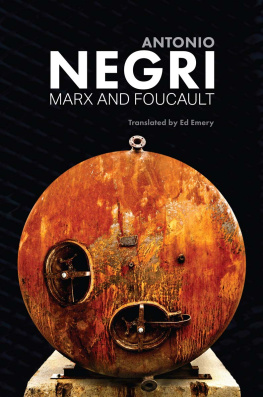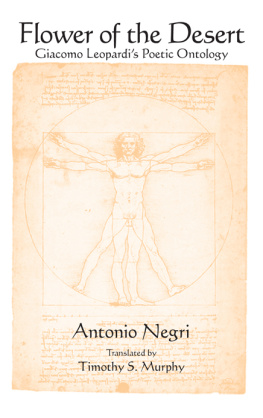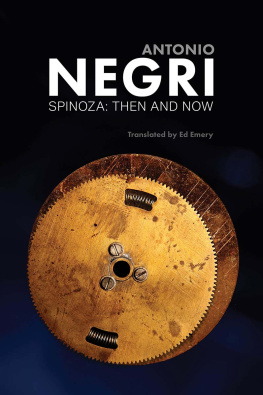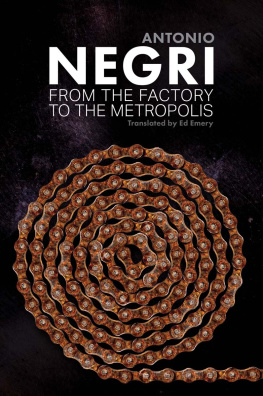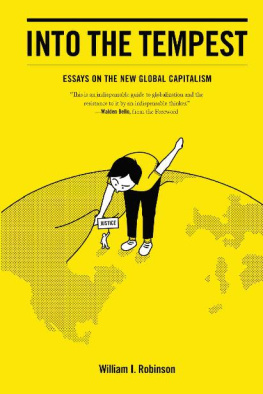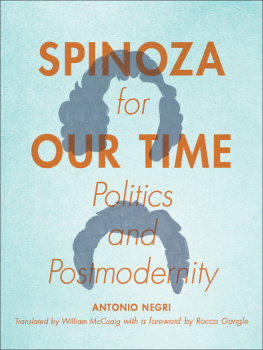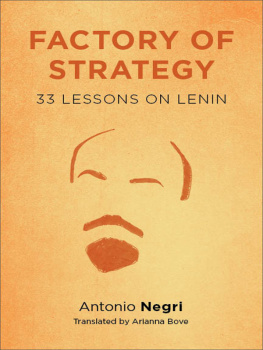TITLES IN THE BLOOMSBURY REVELATIONS SERIES
Aesthetic Theory, Theodor W. Adorno
On Religion, Karl Barth
The Intelligence of Evil, Jean Baudrillard
In Defence of Politics, Bernard Crick
Intensive Science and Virtual Philosophy, Manuel DeLanda
A Thousand Plateaus, Gilles Deleuze and Flix Guattari
Anti-Oedipus, Gilles Deleuze and Flix Guattari
Taking Rights Seriously, Ronald Dworkin
Discourse on Free Will, Desiderius Erasmus and Martin Luther
Education for Critical Consciousness, Paulo Freire
To Have or To Be?, Erich Fromm
Truth and Method, Hans Georg Gadamer
All Men Are Brothers, Mohandas K. Gandhi
Eclipse of Reason, Max Horkheimer
After Virtue, Alasdair MacIntyre
Time for Revolution, Antonio Negri
The Politics of Aesthetics, Jacques Rancire
An Actor Prepares, Constantin Stanislavski
Building a Character, Constantin Stanislavski
Creating a Role, Constantin Stanislavski
Some titles are not available in North America.
Time for Revolution
Antonio Negri
Translated by Matteo Mandarini

Bloomsbury Academic
An imprint of Bloomsbury Publishing Plc
50 Bedford Square London WC1B 3DP UK
175 Fifth Avenue New York NY 10010 USA
www.bloomsbury.com
This English translation Bloomsbury 2003
This edition published 2013 by Bloomsbury Academic
La consituzione del tempo Manifestolibri 1997
Kairos, Alma Venus, Multitudo Manifestolibri 2000
Introduction and Editorial Bloomsbury 2003
Antonio Negri, 2003
All rights reserved. No part of this publication may be reproduced or transmitted in any form or by any means, electronic or mechanical, including photocopying, recording, or any information storage or retrieval system, without prior permission in writing from the publishers.
No responsibility for loss caused to any individual or organization acting on or refraining from action as a result of the material in this publication can be accepted by Bloomsbury Academic or the author.
British Library Cataloguing-in-Publication Data
A catalogue record for this book is available from the British Library.
ISBN: 978-1-7809-3666-6
Library of Congress Cataloging-in-Publication Data
A catalog record for this title is available from the Library of Congress.
Contents
I would like to start by thanking Tristan Palmer and Rowan Wilson at Bloomsbury Academic for their patience and assistance throughout this project. I have also been fortunate to have had the encouragement of Michael Hardt, whose skills as a reader have been invaluable. I am indebted to Stephen Houlgate for tracing a reference to Hegel from a single (mistranslated) word. Susan and Francesco Mandarini provided indispensable support and advice from the beginning to the end of this projectit could not have happened without them. Thanks to Juliet Rufford for showing extraordinary patience and perseverance with my syntax and me. The introduction is a good deal less opaque thanks to her hard work. And I would also like to thank Eliot Albert, Tariq Goddard and Alberto Toscano for many hours of debate that, in one way or another, found their way into this book. Alberto Toscano provided typically incisive comments on several drafts of this introduction and suggestions for the notes to the translations themselves.
Finally, I am most grateful to Antonio Negri for suggesting that I bring together these two texts in the first place. I have gained a great deal from reading, translating and writing about his work but even more from his intellectual generosity and commitment.
Matteo Mandarini
Labour is the living, form-giving fire; it is the transitoriness of things, their temporality, as their formation by living time.
KARL MARX, Grundrisse
The two texts by Antonio Negri, translated into English and brought together here for the first time, display a formidable capacity for compression. The Constitution of Time (1981)originally published as the final chapter of the collection of essays Macchina tempo (Negri 1982a), covering the period 197681arguably represents the high point of the theoretical and practical work carried out over the course of a decade or more by Antonio Negri and his comrades and collaborators, while it also exhibits the productive aporias, the resolution of which would occupy Negri over the next decade. Kairs, Alma Venus, Multitudo (2000a), Negris latest book, matches the earlier work in terms of its force of concentration, drawing together in a single, dense text the results of the work that followed The Constitution of Time in the 1980s and 1990s. Kairs, Alma Venus, Multitudo was written after Negris work on Empire was finished, yet it represents a deepening of the conceptual assemblage provided in the latter collaborative work.
Antonio Negris writings are notoriously difficult in the Italian, and they become doubly so for a reader who is largely unacquainted with the debates of Operaismo. But the works they have produced, and even Empire itself, would have failed to make the impact that they have made outside the academy had their publication not intersected with the emerging, global subjectivities of what, in Italy, has become known as Il popolo di Seattle and the new cycle of struggles that hasso farled from the American city to Genoa, Barcelona and Florence.
For The Constitution of Time, I have provided some further information for the reader (mainly drawn from Negris own writings) in the translators notes. In the case of Kairs Alma Venus, Multitudo, I have let what is a remarkably self-sufficient text speak largely for itself. Its development is driven by an autonomous logic, a cumulative composition, and exhibits constant feedback-effects that perpetually unground and refound it. From first, second, third... to nth foundation. Too many notes would only dislocate the consistency of the composition, as would too many external references. Conversely, The Constitution of Time is heavily interspersed with citations and references. While in prison Antonio Negri used notebooks to jot these down from the limited number of books he was allowed to have at any one time. As he recalled in his 1997 Introduction (reprinted here as an Afterword), many of these notebooks were destroyed in the piss and fire of the repressors, for no other reason than that dictated by the revenge of a rabble of cowardly and ignorant prison guards. Despite his and my best efforts, it has been impossible to track some of these references down. The Bibliography is thus reconstructed almost entirely from memory and guesswork.
In 1981 Antonio Negri had been in prison for almost two years pending trial. He would remain there for another two before his election as Radical Party member to parliament and, following the subsequent Chamber of Deputies vote to rescind his parliamentary immunity, his flight into exile in Paris. Perhaps these particular circumstances, in which were those most conducive to taking stock of the theoretical and practical work accomplished over the preceding years. Two different prisons; two different books.
But it is not just the circumstances of composition that link these texts together. Nor is it simply the recapitulative force, the extraordinary compression and the desire to make sense of the intense years that preceded, common to both these texts, that make the present volume more than an arbitrary collection. It provides indispensable material for understanding the development of Negris thoughtnot only that carried out in his years of exile, but also the collaborative work with Michael Hardtand for grasping the new possibilities for collective action in the face of the new
Next page



